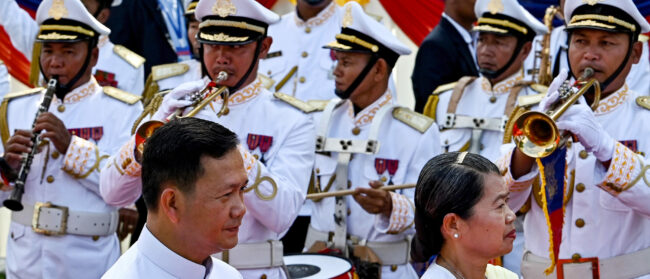The three million people across Cambodia who voted for change in last year’s commune elections find themselves facing a difficult choice: cast a vote for one of the many minor parties fighting over the scraps of anti-government sentiment, or boycott the ballot and risk the wrath of local ruling party officials
The three million people across Cambodia who voted for change in last year’s commune elections find themselves facing a difficult choice: cast a vote for one of the many minor parties fighting over the scraps of anti-government sentiment, or boycott the ballot and risk the wrath of local ruling party officials
The Butcher is no stranger to the taste of fear. In 1978, as the collapsing Khmer Rouge regime launched raid after raid across the Vietnam border, he was press-ganged into the regime’s ragtag army and sent to fight. When the Vietnamese army came pouring across the border, he fled the frontlines to find his long way home to Kampong Thom. Fear walked beside him every day, he said.
Now, leaning over a scratched metal table at his shop in central Kampong Thom, the Butcher – who like most people interviewed by Southeast Asia Globe has had his name withheld to protect his identity – recounts how he sat at this very spot with his friends as the 2013 election results rolled in.
“I was drinking here with some other people and listening to the votes being counted on the radio, and the CNRP was winning everywhere – we were all cheering,” he recalled. “That’s when the radio frequency suddenly cut off. I said, ‘What the hell was that?’ We guessed that the CNRP would win, but the next morning, when the official result was announced, they said the CPP had won. It was a huge disappointment.”
That disappointment would return again many times in the lead-up to this month’s national election. The CNRP has been dissolved by a Supreme Court headed by a member of the ruling party. Former CNRP leader Sam Rainsy remains in exile along with half the party’s leadership, who are under a five-year ban from all political activity. Its president, Kem Sokha, languishes in prison on the Vietnamese border on charges of treason, repeatedly denied bail, unable to reach out to his supporters.
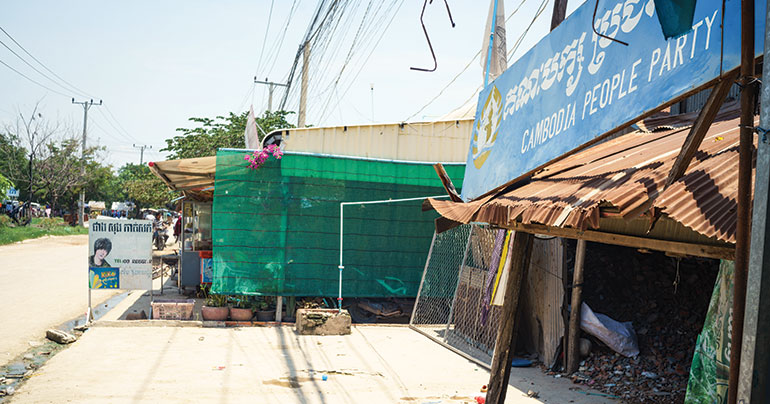
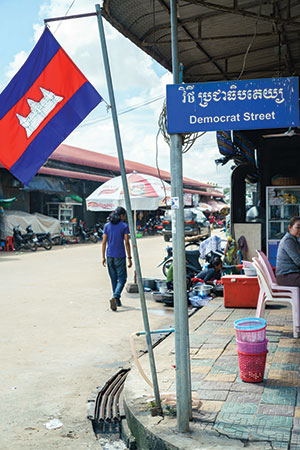
With few other weapons left in his arsenal, Rainsy has called on Cambodians to boycott the election. The government has grown increasingly strident in its calls for Cambodians to turn out on election day, with Prime Minister Hun Sen repeatedly threatening legal action against anyone urging Cambodians to stay home.
Interviews conducted by Southeast Asia Globe across three provinces revealed a growing climate of fear driven by local CPP officials allegedly abusing their power to deprive suspected opposition supporters of essential government services. Those who have grown frustrated with 30 years of CPP rule now find themselves forced to choose between being complicit in an election they see as illegitimate and facing the consequences a boycott could bring down on their families.
The Butcher claimed that his local commune officials had threatened to withhold their services as essential notaries and mediators to citizens not bearing the telltale ink on their index finger following this month’s commune elections.
“If you’re not going to vote, they say, you’re not a legitimate citizen,” he said. “So they mark down your name and they don’t help you with papers or approval on anything.”
Commune councils are responsible for ensuring their constituents have access to essential health and social services, and oversee the bureaucracy of day-to-day life. Commune chiefs, deputies and clerks serve as mediators in business and family life, overseeing marriages and divorces. Hun Sen’s Cambodia author Sebastian Strangio said that the ruling party had long used its stranglehold on local government to pressure Cambodian citizens.
“In the past, the CPP has used its local organisations and working groups to forcibly enroll people in the CPP, as in the ’93 and ’98 elections,” he said. “I presume the CPP will deploy the many local government and party offices to encourage people to come out and vote.”
If you give them a light, they will explode. I still see that strength, and their support for the party
That incitement hasn’t impressed the Butcher. Unable to bring himself to cast a vote for the ruling party – or the other 19 minor parties listed on the ballot – he finds himself caught between Rainsy’s calls for boycott and the fear that failing to turn up on election day will see him targeted by officials.
“I will go, but it doesn’t mean I will vote,” he said. “I’ll just turn up and dip my finger in the ink. I’m also telling people, ‘Hey, let’s go vote,’ and my friends say, ‘I won’t go, I don’t know which party to vote for.’ And I encouraged them to go like me – just to turn up, to go to the polling station and dip their fingers, and then leave the station without voting, to avoid the threat.”
It is a climate of paranoia that the Counselor knows only too well. Elected deputy chief of the Butcher’s small commune in Kampong Thom in last year’s local elections, the Counselor was forced from his position following his party’s dissolution last November. Even after months of working closely with the new local administration, he still feels the eyes of the ruling party burning on the back of his neck.
“At the moment, my children and I are living with fear,” he told Southeast Asia Globe. “If people found out that I’d given an interview to the press like this, I’ll be in trouble,” he said. “I’ve been stalked, watched by CPP spies. I’m with the CPP now, but I’m still under surveillance.”
A month after the CNRP’s destruction, the Counselor was back in the commune hall – though now, he says, he serves the ruling party that stripped him of his party and position. It was a decision motivated as much by CPP pressure at it was by civic duty, he said.
“After the last commune election, after our party was dissolved, people demanded that I be back in power so that they could get help,” he said. “But I was powerless – I didn’t have authority to help them any more. And I had to think of a way to help them. I had to join the ruling party – because the CNRP is gone, so I had to defect to the CPP. And now I can offer some help. Although I’m just a counselor, I work like a commune chief, signing papers and trying to liaise with the commune chief to get him to work with the villagers. I see people desperate for help. They desperately need our support. They voted for us, which means they expected that support from us. So how can I give up on them?”
Sprawled on the banks of the Mekong River, Kampong Cham city has long been a hub of hardline opposition. In 2012, the combined Sam Rainsy Party/Human Rights Party wrested 12 commune seats from the ruling party, a feat equalled only in neighbouring Kratie. Last year, it walked away with 74 seats to the CPP’s 35.
Than Sorith is still proud of all that his party accomplished. He has long campaigned for the opposition as the owner of two radio stations that broadcast news critical of the government before the frequencies were shuttered by the ruling party last year. He once drove village to village with a portable projector, holding screenings demonstrating the widespread deforestation by powerful figures with links to the ruling party.
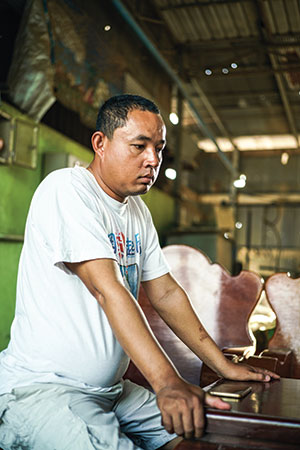
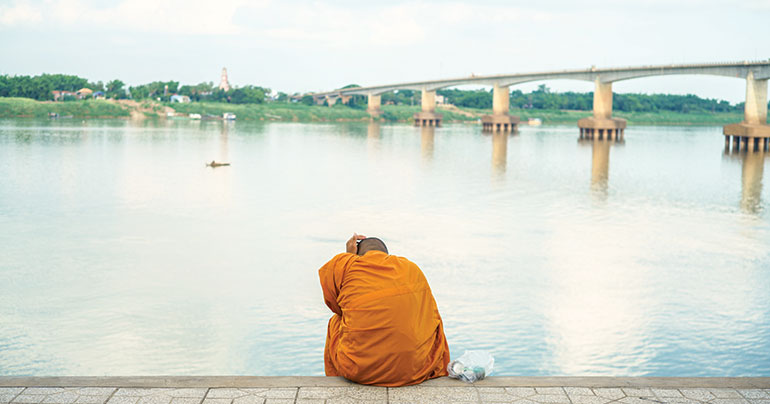
Sitting in a garage on the side of a roaring highway, he described how his crusade for change had been forced underground: “There has been discrimination among the CPP party leaders in the province, but our supporters still tell us to stay strong. I keep telling our grassroots leaders that we will keep fighting – we’ll avoid conflict, avoid the storm, just let it rain and stay calm.”
Although he said some supporters had lost faith in a movement stripped of its leaders and legitimacy, Sorith estimated that four out of five opposition supporters were waiting for a chance to fight for the nation’s fate.
“That 80% still have something burning inside them. They’re ready to participate, to do something,” he said. “If you give them a light, they will explode. I still see that strength, and their support for the party.”
On the outskirts of Phnom Penh’s Sen Sok district, a dry wind is whipping the dusty roads to frenzy. In many ways, this is a place where lost things find themselves: it was here that dozens of families forcibly evicted from the city centre found themselves cast after their homes in Dai Krahom were bulldozed to make way for private developments. The former commune chief won’t meet us in person – he’s afraid his CPP successors in the commune hall will find out. Speaking with Southeast Asia Globe by phone, he expresses his bitter disappointment over being unable to fulfill his mandate as the people’s representative.
“I would like to carry out the trust the voters have in us,” he said. “But it’s shattered completely. I have no rights any more, I can no longer represent the party to offer those social services that people expect from us without discrimination. I really wish I could fulfil the interest of the locals who turned up for the vote last year. It’s very disappointing. I used to get people participating and raising their concerns, and now no one goes to listen to them. I’m afraid that if I say more, I’m going to affect the current leadership at the commune hall. I’ve been monitored closely. Now we have no free space any more.”
When the Mechanic first came to Sen Sok, his new home had no fresh water or electricity. Unsurprisingly for a man whose home was taken from him by big business supported by the ruling party, he and his wife have long supported the CNRP’s opposition to a government they believe has always put personal profit above people.
The Mechanic wears a hunted look as he recalls the long months following the opposition’s defeat: “We still talk politics among our own circle, but we know who’s who. We keep our circle small, we don’t talk to strangers… In the circle, we speak from the same mind – we’re trying to figure out a strategy. But we’re stuck.”
Like many of those Southeast Asia Globe spoke with, the Mechanic and his wife were struggling to decide whether they could risk staying home on election day.
“It’s bad, because we have been discussing not going to vote,” he said. “But we also have a backup plan: we go and scratch the papers [leaving the ballot blank or invalid]. But I’m afraid they’re going to count that as a ruling-party vote. I feel very hopeless. I don’t know what to do.”
With the CNRP leadership in prison or scattered across the globe, and the nation’s military and police dominated by the ruling party, it seems unlikely that a CPP win would be greeted by the same widespread street protests that followed the controversial 2013 result. Strangio said that for many Cambodians, ways of expressing dissatisfaction with the CPP’s actions were running thin.
“What we are more likely to see than an uprising in the street is this sort of passive resistance where people drag their feet,” he said. “People have been doing this for years – this isn’t a new thing. When you talk to people in villages, they will express critical views of the CPP and the authorities and a great deal of skepticism about their pretensions and claims. Whether that actually affects the CPP’s grip on power in this election remains unclear. I do think a boycott is a potentially embarrassing thing for the CPP if it gathers momentum and a large portion of the public buy into it.”
The Barber, who moved to Sen Sok from Kampong Cham as business grew worse and worse in his home province, is less confident about his countrymen’s conviction to carry out a mass boycott of the election.
“People might change their minds – they will see which way the wind is blowing,” he says. “In general, my experience is that Cambodians say no at the beginning, but say yes at the very last minute because their neighbours and friends are going, and if they don’t go as well, they may be excluded or targeted.”
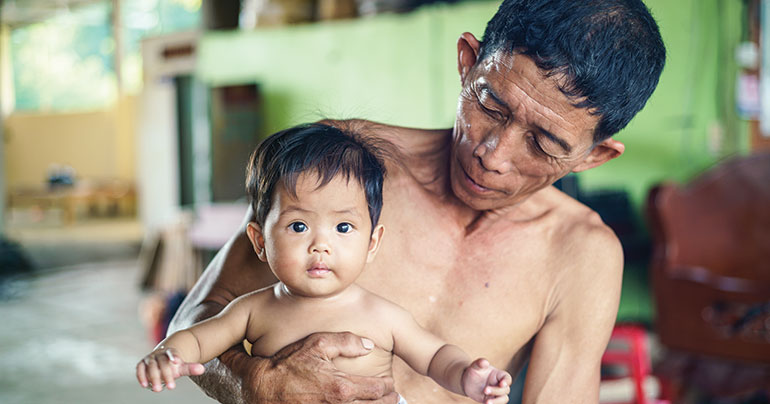
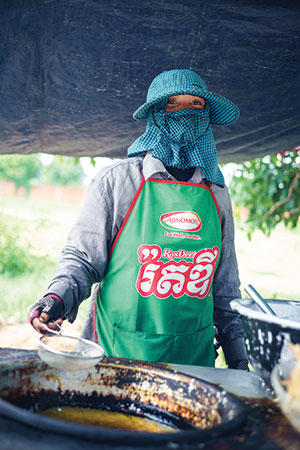
That pressure from his neighbours to cast a vote is strong, he says: “To be honest, I’ll just go to fulfil my obligation, just to make sure I go and dip my finger in the ink, to show up but not to vote. Because there’s really no choice. We’re not satisfied, but we don’t have options.”
Despite the Barber’s reservations, a quick glance at the ballot reveals abundant choices. Those Cambodians who head to the polls on 29 July will find a slew of apparent options, with a 20-strong list of parties to vote for. They include the Khmer National United Party, whose leader, Nhek Bun Chhay, was released from prison earlier this year in preparation for the poll; and the litigious Cambodian Youth Party, whose leader has called for the expulsion of all illegal immigrants within eight hours of his victory and whose lawsuits against the CNRP helped usher in the main opposition party’s dissolution. Rainsy has dismissed the 19 minor parties – which between them won less than 4% of the national vote last year – as “ahp parties”, in reference to a bodiless Cambodian spirit that lives in its own filth and drinks the blood of unsuspecting villagers.
It is not a comparison that many of the CNRP’s would-be successors have welcomed. Grassroots Democracy Party (GDP) co-founder Yang Saing Koma, whose progressive party is seen as one of the few political movements left in the country that doesn’t have ties to the CPP, said his party offered a middle way for voters dissatisfied with both the ruling party and the now-defunct opposition.
“We represent ourselves as a centrist, socially liberal [party], and we’re aiming to get support from some people who used to support the CNRP and some who supported the CPP,” he said. “So we don’t mind about this appeal to ask the supporters to boycott the election, because some of [Rainsy’s] supporters will follow him, but in the general population, there will be a lot of people who will come to vote – and many of them I think will vote for us.”
Strangio was dubious that any of the minor parties possessed the basic resources and infrastructure necessary to fill the gaping void left by the late CNRP.
“There’s unlikely to be an opposition party that runs in enough seats nationwide to pose a threat to the CPP, so it doesn’t matter who people vote for as long as the turnout is relatively high, which the CPP will be able to point to as a sign that Cambodians still have democracy and that the abolition of the CNRP is not the abolition of the multiparty system,” he said.
Asked whether he was worried that the GDP could suffer the same fate as the CNRP if its popularity surged in the upcoming elections, Saing Koma admitted that his party was keen to avoid conflict with the ruling party – a pragmatic approach that seems unlikely to meet the demands of opposition voters frustrated by what they see as decades of corruption and nepotism from Hun Sen’s government.
“I think the dissolution of the CNRP, for us, was a political mistake and has already caused a lot of serious problems among the Cambodian and international communities,” he said. “But we are a bit different from the CNRP. We are focusing on good policies, we are not trying to create problems through our language, we try to avoid direct confrontation, we have national reconciliation policies. We’re willing to work with the CPP as long as we agree on common policies.”
For the Barber, it’s not enough. Staring out across the dusty roads of Sen Sok, he describes a future that feels all too familiar to those who have grown up under the thumb of a one-party state.
“It’s just a one-man show – you’ll win anyway, and so no one is going to criticise you,” he said. “You don’t know what flaws you have. If there were a strong opposition party like before, there would be someone to criticise you and your policies and have some impact on decision-making in parliament, but now you’re alone – you don’t know what you lack or how you could make it better. You just live in your own world. Everything else, you’ve shut down.”


